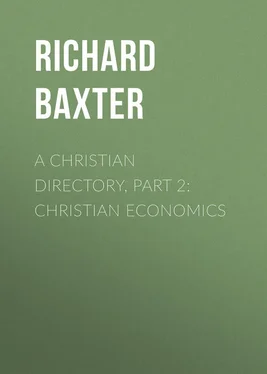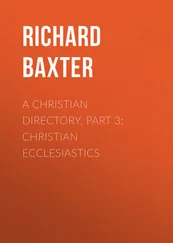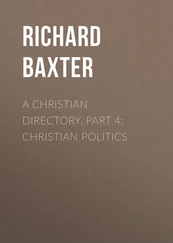Richard Baxter - A Christian Directory, Part 2 - Christian Economics
Здесь есть возможность читать онлайн «Richard Baxter - A Christian Directory, Part 2 - Christian Economics» — ознакомительный отрывок электронной книги совершенно бесплатно, а после прочтения отрывка купить полную версию. В некоторых случаях можно слушать аудио, скачать через торрент в формате fb2 и присутствует краткое содержание. Жанр: foreign_antique, foreign_prose, на английском языке. Описание произведения, (предисловие) а так же отзывы посетителей доступны на портале библиотеки ЛибКат.
- Название:A Christian Directory, Part 2: Christian Economics
- Автор:
- Жанр:
- Год:неизвестен
- ISBN:нет данных
- Рейтинг книги:5 / 5. Голосов: 1
-
Избранное:Добавить в избранное
- Отзывы:
-
Ваша оценка:
- 100
- 1
- 2
- 3
- 4
- 5
A Christian Directory, Part 2: Christian Economics: краткое содержание, описание и аннотация
Предлагаем к чтению аннотацию, описание, краткое содержание или предисловие (зависит от того, что написал сам автор книги «A Christian Directory, Part 2: Christian Economics»). Если вы не нашли необходимую информацию о книге — напишите в комментариях, мы постараемся отыскать её.
A Christian Directory, Part 2: Christian Economics — читать онлайн ознакомительный отрывок
Ниже представлен текст книги, разбитый по страницам. Система сохранения места последней прочитанной страницы, позволяет с удобством читать онлайн бесплатно книгу «A Christian Directory, Part 2: Christian Economics», без необходимости каждый раз заново искать на чём Вы остановились. Поставьте закладку, и сможете в любой момент перейти на страницу, на которой закончили чтение.
Интервал:
Закладка:
Arg. IV. Daniel prayed in his house thrice a day; therefore less than twice under the gospel is to us unreasonable.
Arg. V. 1 Tim. iv. 5, "She that is a widow indeed and desolate, trusteth in God, and continueth in supplications and prayer night and day." Night and day can be no less than morning and evening. And if you say, this is not family prayer, I answer, 1. It is all kind of prayer belonging to her. 2. And if it commend the less, much more the greater.
Arg. VI. From Luke vi. 14; ii. 37; xviii. 17; Acts xxvi. 7; 1 Thess. iii. 10; 2 Tim. i. 3; Rev. vii. 15; Neh. i. 6; Psal. lxxxviii. 1; Josh. i. 8; Psal. i. 2; which show that night and day Christ himself prayed, and his servants prayed, and meditated, and read the Scripture.
Arg. VII. Deut. vi. 7; xi. 19, it is expressly commanded that parents teach their children the word of God, when they "lie down, and when they rise up;" and the parity of reason, and conjunction of the word and prayer, will prove, that they should also pray with them lying down and rising up.
Arg. VIII. For brevity sake I offer you together, Psal. cxix. 164, David praised God seven times a day; and cxlv. 2, "Every day will I bless thee." Psal. v. 3, "My voice shalt thou hear in the morning, O Lord; in the morning will I direct my prayer to thee, and will look up: " lix. 16, "I will sing aloud of thy mercy in the morning: " lxxxviii. 13, "In the morning shall my prayer prevent thee: " xcii. 12, "It is good to give thanks unto the Lord, and to sing praises to thy name, O Most High: to show forth thy loving-kindness in the morning, and thy faithfulness every night: " cxix. 147, 148, "I prevented the dawning of the morning and cried, I hoped in thy word: mine eyes prevent the night watches, that I might meditate on thy word: " cxxx. 6, "My soul waiteth for the Lord more than they that watch for the morning, I say more than they that watch for the morning." The priests were to offer "sacrifices" and "thanks to God every morning," 1 Chron. xxiii. 30; Exod. xxx. 7; xxxvi. 3; Lev. vi. 12; 2 Chron. xiii. 11; Ezek. xlvi. 13-15; Amos iv. 4. And christians are a "holy priesthood, to offer up sacrifices to God, acceptable through Jesus Christ," 1 Pet. ii. 5, 9. Expressly saith David, Psal. lv. 17, "Evening, and morning, and at noon, will I pray and cry aloud, and he shall hear my voice." So morning and evening were sacrifices and burnt offerings offered to the Lord; and there is at least equal reason that gospel worship should be as frequent: 1 Chron. xvi. 40; 2 Chron. ii. 4; xiii. 11; xxxi. 3; Ezra iii. 3; 2 Kings xvi. 15; 1 Kings xviii. 29, 36; Ezra ix. 5. And no doubt but they prayed with the sacrifices. Which David intimateth in comparing them, Psal. cxli. 2, "Let my prayer be set forth before thee as incense, and the lifting up of my hands as the evening sacrifice." And God calleth for prayer and praise as better than sacrifice, Psal. l. 14, 15, 23.
All these I heap together for despatch, which fully show how frequently God's servants have been wont to worship him, and how often God expecteth it. And you will all confess that it is reason that in gospel times of greater light and holiness, we should not come behind them in the times of the law; especially when Christ himself doth pray all night, that had so little need in comparison of us. And you may observe that these scriptures speak of prayer in general, and limit it not to secrecy; and therefore they extend to all prayer, according to opportunity. No reason can limit all these examples to the most secret and least noble sort of prayer. If but two or three are gathered together in his name, Christ is especially among them.
If you say, that by this rule we must as frequently pray in the church assemblies; I answer, the church cannot ordinarily so oft assemble; but when it can be without a great inconvenience, I doubt not but it would be a good work, for many to meet the minister daily for prayer, as in some rich and populous cities they may do.
I have been more tedious on this subject than a holy, hungry christian possibly may think necessary, who needeth not so many arguments to persuade him to feast his soul with God, and to delight himself in the frequent exercises of faith and love; and if I have said less than the other sort of readers shall think necessary, let them know that if they will open their eyes, and recover their appetites, and feel their sins, and observe their daily wants and dangers, and get but a heart that loveth God, these reasons then will seem sufficient to convince them of so sweet, and profitable, and necessary a work; and if they observe the difference between praying and prayerless families, and care for their souls and communion with God, much fewer words than these may serve their turn. It is a dead, and graceless, carnal heart, that must be cured before these men will be well satisfied; a better appetite would help their reason. If God should say in general to all men, You shall eat as oft as will do you good; the sick stomach would say, Once a day, and that but a little, is enough, and as much as God requireth; when another would say, Thrice a day is little enough. A good and healthful heart is a great help, in the expounding of God's word, especially of his general commandments. That which men love not, but are weary of, they will not easily believe to be their duty. The new nature, and holy love, and desires, and experience of a sound believer, do so far make all these reasonings needless to him, that I must confess I have written them principally to convince the carnal hypocrite, and stop the mouths of wrangling enemies.
CHAPTER IV.
GENERAL DIRECTIONS FOR THE HOLY GOVERNMENT OF FAMILIES
The principal thing requisite to the right governing of families, is the fitness of the governors and the governed thereto, which is spoken of before in the directions for the constitution. But if persons unfit for their relations, have joined themselves together in a family, their first duty is to repent of their former sin and rashness, and presently to turn to God, and seek after that fitness which is necessary to the right discharge of the duties of their several places: and in the governors of families, these three things are of greatest necessity hereunto: I. Authority. II. Skill. III. Holiness and readiness of will.
I. Gen. Direct. Let governors maintain their authority in their families. For if once that be lost, and you are despised by those that you should rule, your word will be of no effect with them; you do but ride without a bridle; your power of governing is gone, when your authority is lost. And here you must first understand the nature, use, and extent of your authority; for as your relations are different, to your wife, your children, and your servants, so also is your authority. Your authority over your wife, is but such as is necessary to the order of your family, the safe and prudent management of your affairs, and your comfortable cohabitation. The power of love and complicated interest must do more than magisterial commands. Your authority over your children is much greater; but yet only such as, conjunct with love, is needful to their good education and felicity. Your authority over your servants is to be measured by your contract with them (in these countries where there are no slaves) in order to your service, and the honour of God. In other matters, or to other ends, you have no authority over them. For the maintaining of this your authority observe these following sub-directions.
Direct. I. Let your family understand that your authority is of God, who is the God of order, and that in obedience to him they are obliged to obey you. There is no power but of God; and there is none that the intelligent creature can so much reverence as that which is of God. All bonds are easily broken and cast away (by the soul at least, if not by the body) which are not perceived to be divine. An enlightened conscience will say to ambitious usurpers, God I know, and his Son Jesus I know, but who are ye?
Читать дальшеИнтервал:
Закладка:
Похожие книги на «A Christian Directory, Part 2: Christian Economics»
Представляем Вашему вниманию похожие книги на «A Christian Directory, Part 2: Christian Economics» списком для выбора. Мы отобрали схожую по названию и смыслу литературу в надежде предоставить читателям больше вариантов отыскать новые, интересные, ещё непрочитанные произведения.
Обсуждение, отзывы о книге «A Christian Directory, Part 2: Christian Economics» и просто собственные мнения читателей. Оставьте ваши комментарии, напишите, что Вы думаете о произведении, его смысле или главных героях. Укажите что конкретно понравилось, а что нет, и почему Вы так считаете.












